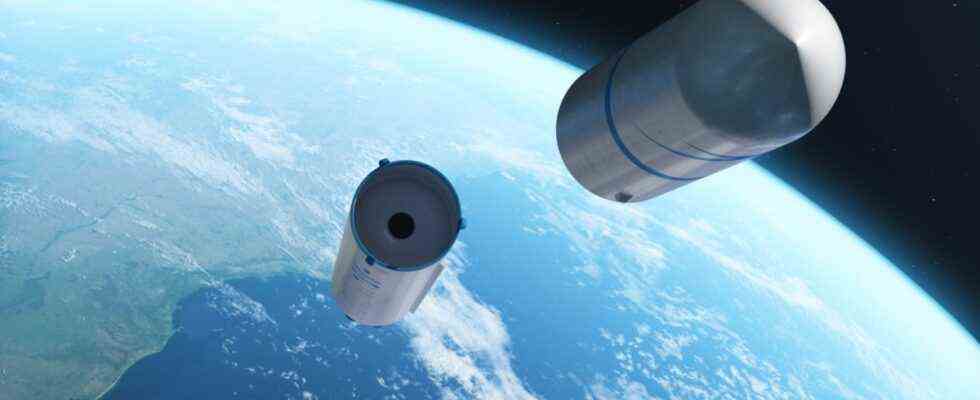When Volkswagen boss Herbert Diess stopped by the newly opened factory of the small rocket manufacturer Isar Aerospace in Ottobrunn near Munich in December last year, a lot was about engineering for the doctor of mechanical engineering. “We talked to Mr. Diess about technologies and possible applications,” says Isar Aerospace boss Daniel Metzler, who like Diess also studied at the Technical University of Munich – albeit space technology. So talking shop among alumni. And about the business model: Isar Aerospace wants to earn its money with commercial flights into earth orbit, possibly also with the establishment of a broadband satellite network. However, the visit was not about Volkswagen’s entry. “Back then we hadn’t even thought of expanding the financing round that had just been completed,” says Metzler, “it was a first meeting.”
Seven months later, the majority shareholder of Volkswagen AG, Porsche SE, is now investing in the rocket start-up. After the first B financial round, which raised EUR 75 million at the end of 2020, Isar Aerospace has now raised another EUR 64 million. The second B-financing round will be led by HV Capital, Porsche Automobil Holding SE and the Lombard Odier banking group, with Porsche said to have contributed a single-digit million amount. The existing investors Earlybird, Lakestar, Vsquared, Apeiron and UVC Partners are also involved again, with Earlybird drawing the largest share. Isar Aerospace’s financing volume has thus risen to more than 150 million euros. “This will make Isar Aerospace the best financed and fastest growing space start-up in the EU,” announced the company.
What does Porsche expect from the investment? They are convinced that access to space “will be an essential key to innovations in traditional industries as well as for new, disruptive technologies and business models,” says Lutz Meschke, member of the executive board of Porsche SE. They want to accompany Isar Aerospace on its way to “becoming the leading European launch service provider with a focus on small and medium-sized satellites”.
Geely invests in its own satellite network
Even if the Porsche Holding emphasizes that it will invest for Volkswagen regardless of possible synergies, it is clear that car companies will also demand such start-up capacities in the medium term. The Chinese auto company Geely is currently investing $ 326 million in a satellite network that will provide broadband communication and navigation for autonomous driving. “Space issues affect many industries and are also of interest to the automotive industry,” says Metzler, “for example when it comes to autonomous driving, car entertainment or the linking of factories.” Many applications are conceivable. For Porsche SE, however, it is not about getting a supplier. “Above all, you see one thing in the investment Business case“The entry of the Porsche Holding is in any case also a signal for the so-called old economy. Satellite-based technologies have the potential to become” the backbone for traditional and emerging industries alike, “said Metzler. Start-up capacities are essential for this. There are other car companies who are interested in Isar Aerospace, not only in Europe.
Isar Aerospace, which now has 180 employees, wants the money to be used in its launch, test and production infrastructure for the construction of its 27-meter-long two-stage launcher Spectrum invest that will be powered by hydrocarbons and liquid oxygen. The “largely automated production” has already started and the first flight is planned for the middle of next year in Andøya, Norway. Engine tests are in progress in Kiruna, Sweden.
Construction of the lower stage of the “Spectrum” rocket at Isar Aerospace in Ottobrunn.
(Photo: Isar Aerospace / oh)
What future customers will pay is still unclear. “Our goal is to get the price for the payload below 10,000 euros per kilogram,” says Metzler. For comparison: The start-up RFA Augsburg is targeting 2,300 euros with its microlauncher, Hyimpulse 7,000 euros. “We cannot assume that we will get government contracts at any price, we have to remain realistic in order to become profitable,” says Metzler. He wants to sell around ten rockets a year in five years, and up to 30. In the future, Isar will earn money earlier, and that doesn’t require ten launches. According to him, no further round of financing either. “We are fully financed until the first launch.”
An IPO is also conceivable
What’s next? “An IPO is conceivable in the future, but it won’t happen before our first launch,” says Metzler. “We can build the company better and faster if we are privately financed and have fewer obligations like those on the stock exchange.”
The New Zealand-American small rocket manufacturer Rocket Lab, which has had 20 launches since 2017, including three false starts, will soon go to the trading floor with an empty wallet, so it is using a Spac (Special Purpose Acquisition Company). This is not an option for Isar Aerospace, says Metzler. He is now concentrating on the start of the premiere.
In any case, the interest of donors in the industry is growing: Analysts from Allied Market Research put the market for launch services at a good 30 billion euros for 2027, a third of which is for small and medium-sized satellites. “Own launcher systems play an enormous role in the value chain of the emerging space economy,” says Herbert Mangesius from investor Vsquared. “We are convinced that one of the few new launcher companies in the world will grow out of Ottobrunn, which is why we are increasing our commitment as investors.”

